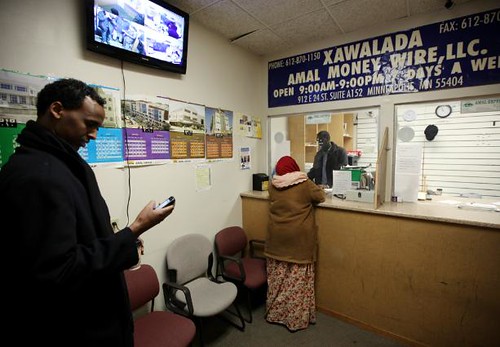
Somalian-Americans line up to transfer money to their families still living inside the Horn of Africa nation. The US government has targeted Somalians for harrassment., a photo by Pan-African News Wire File Photos on Flickr.
Somalia money business warns ‘money will go underground’ if banks shut down transfer channel
By Associated Press, Published: July 2
JOHANNESBURG — The chief executive of Somalia’s largest money transfer company warned Tuesday that funds wired into the country could “go underground” if Somalis aren’t able to send money to family members through banks.
Abdirashid Duale, the chief executive of Dahabshiil is asking Barclays bank to reconsider a decision announced last month to stop facilitating money transfers to some companies in Somalia. Banks worried about anti-terror regulations have grown wary of facilitating transfers into Somalia, where the al-Qaida-linked militant group al-Shabab still controls a wide region.
The space program’s third failure this year might delay a cargo flight to the international space station.
Somalia’s diaspora community sends $1.2 billion into Somalia annually, according to a study released this month by the U.N.’s food and agricultural agency. That money is desperately needed in one of the world’s poorest countries.
“What’s the alternative? The alternative is that people will go underground, and then the regulators won’t see who is sending money,” Duale told The Associated Press by telephone. “Money will go on flights and be transported in pockets.”
Dahabshiil is one of Somalia’s rare business successes. Started in 1970 by Duale’s father, the company says it employs more than 5,000 people in 150 countries. The company helps transfer money for such humanitarian groups as the U.N., Oxfam and Save the Children.
Duale says Dahabshiil is in compliance with all international banking regulations. He shared a portion of a letter from Barclays that said the decision to sever ties “is not a negative reflection of your Anti-Money Laundering standards, nor a belief that your business has unwittingly been a conduit for financial crime,” but rather is because of the risks “of the sector in which you operate.”
That risk, Duale argues, is in inherent in all money transfers. He noted that the 9/11 commission that investigated the 2001 attacks in the United States found that the attackers used Western banking institutions to transfer money.
“We have our compliance system to follow. We ask people for ID. There is a database we can check if they are a member of al-Shabab or not,” he said. “The risks are always there. The risk is not unique for a specific company.”
Barclays said in a statement last week that as a global bank it must comply with rules and regulations in all the jurisdictions in which it operates.
“It is recognised that some money service businesses don’t have the proper checks in place to spot criminal activity and could unwittingly be facilitating money laundering and terrorist financing,” it said. “Abuse of their services can have significant negative consequences for society and for us as their bank.”
Barclays said it is happy to maintain a relationship with businesses that have anti-financial crime controls. Western Union operates in Somalia but does not have a presence in many places, including the capital, Mogadishu.
Aid groups that work in Somalia are worried about the possible impact of Barclays’ decision. A coalition of aid groups said that one study of financial transactions in Somalia found that 73 percent of remittance recipients said that they use the money they receive from relatives — an average of $2,040 per year — to pay for basic food, education, and medical expenses.
No comments:
Post a Comment